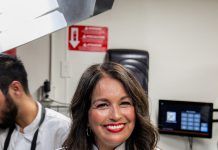Following a La Mesa city council discussion held April 27 on how to fill former La Mesa Vice Mayor Akilah Weber’s seat, the initial vote was locked two-two on whether to move forward with an appointment or special election.
After further discussion, Mayor Mark Arapostathis and the remaining three city council members subsequently voted unanimously to have staff bring updated cost and schedule information on a special election to the next council meeting.
Weber left the seat at City Council open when she was sworn in to represent California State Assembly District 79, following an April 6 special election.
According to La Mesa Government Code Section 36512(b), the council had 60 days from the time Weber submitted her resignation on April 19 to decide which path they would take to fill her seat; they now must schedule a special election or make an appointment by June 18.
La Mesa City Clerk Megan Wiegelman reported that appointing someone to fill the seat would mean publicly publishing the opening, collecting applications from interested persons and holding a public hearing with candidates. City council members would then appoint an individual from that pool of applicants to fill the vacancy for about 18 months until the next general election in November, 2022.
Alternatively, Wiegelman said, holding a special election on the next regular, established election date for San Diego county, would mean putting it to a vote on either August 31 or November 2.
Per County Registrar of Voters, Wiegelman said, a special election would cost between approximately $550,000 and $850,000.
During discussion, Arapostathis and Council member Bill Baber were in favor of holding a special election while Council members Jack Shu and Colin Parent spoke in favor of filling Weber’s seat by appointment.
“I’ve been meeting with people who have already been recruited by council members,” Arapostathis said, all of whom said they were recruited by a city council member.
Parent countered and said their claims might not be entirely accurate—he believes a closer questioning might reveal someone simply wanted the position and is falsely claiming to have been recruited in order to get their foot in the door.
Council member Bill Baber said he passionately stands behind a special election, despite some cost to the city, and questioned whether piggybacking onto the upcoming election to potentially recall Governor Gavin Newsom might reduce some of those costs. In particular, he said, an all mail-in ballot for that vote could potentially cost the city far less than an in-person vote.
“I know there is a cost associated with it and I know democracy costs money but I think it is important to have it out in the open with transparency,” Arapostathis said.
Resorting to an appointment process, he said, would leave the city vulnerable to having just three people recruit a fourth city council member, potentially leaving out good candidates who might not be in the know.
Council member Jack Shu said existing council members were elected to be there and having those elected officials appoint someone is not undemocratic, but understands “the sentiment of wanting to have a vote for an open seat”. However, that sentiment, he said could cost upwards of $180,000 in city council meetings to hold a special election.
Council member Colin Parent said he believes voter turnout for a special election would be much lower than the general election in which current city council members were elected.
“When you do these special elections, voters tend to be older and more conservative. The results are different due to the electorate,” and appointments might actually represent a broader group of people, Parent said.
In total, 103 public comments submitted ahead of time voiced support of a special election and 13 comments were submitted in favor of appointment.
One community member who called in noted the cost of a special election is less than 1% of the fiscal year’s budget. Another speaker, Antonio Gonzalez said “we elect council members to make decisions for us” but we don’t elect council members to take away our voice by appointing someone to an elected position.
Council member Jack Shu asked if it would be possible to begin the process of asking who might be interested in an appointment while simultaneously beginning the process of enacting a special election through the county registrar of voters.
Wiegelman confirmed there is the possibility of having a June 8 council meeting with interviews and a potential appointment with the option to call for a special election.
“Elections do things to people that make them better candidates,” Baber said, adding that he stands firm in his conviction that a vote is the better option, then made a motion to recommend staff provide details of a recall election with Arapostathis seconding.
Baber and Arapostathis voted in favor of holding a special election; Parent and Shu voted against the motion.
The next public meeting is scheduled for May 11.














